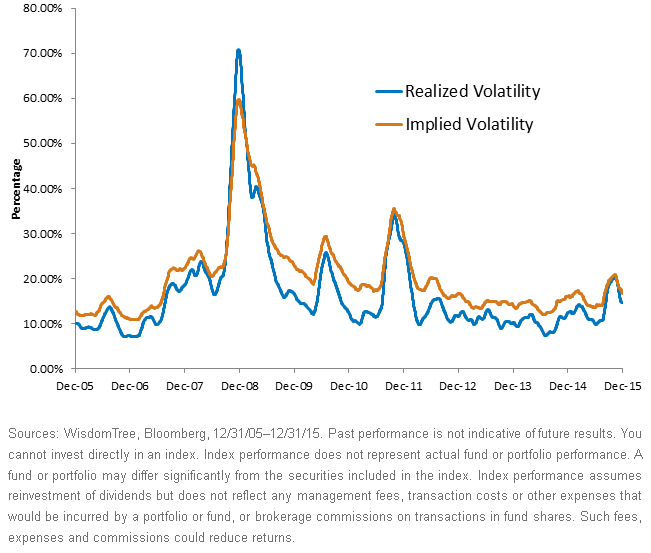The WisdomTree CBOE S&P 500 PutWrite Strategy Fund: A Premium Opportunity


 Why Invest in PUTW?
The WisdomTree CBOE S&P 500 PutWrite Strategy Fund (PUTW) provides:
• Ability to potentially profit from implied volatility typically being higher than realized volatility
• The premiums the Fund collects may help provide a cushion when the S&P 500 performs negatively
• Potential for enhanced risk-adjusted returns
• All the benefits of the ETF structure
1The gross expense ratio is 0.44%. The net expense ratio reflects a contractual waiver of 0.06% through 12/31/16.
Why Invest in PUTW?
The WisdomTree CBOE S&P 500 PutWrite Strategy Fund (PUTW) provides:
• Ability to potentially profit from implied volatility typically being higher than realized volatility
• The premiums the Fund collects may help provide a cushion when the S&P 500 performs negatively
• Potential for enhanced risk-adjusted returns
• All the benefits of the ETF structure
1The gross expense ratio is 0.44%. The net expense ratio reflects a contractual waiver of 0.06% through 12/31/16.Important Risks Related to this Article
There are risks associated with investing, including possible loss of principal. The Fund will invest in derivatives, including S&P 500 Index put options (“SPX Puts”). Derivative investments can be volatile, and these investments may be less liquid than other securities, and more sensitive to the effects of varied economic conditions. The value of the SPX Puts in which the Fund invests is partly based on the volatility used by market participants to price such options (i.e., implied volatility), so increases in the implied volatility of such options will cause the value of such options to increase, which will result in a corresponding increase in the liabilities of the Fund and a decrease in the Fund’s NAV. Options may be subject to volatile swings in price influenced by changes in the value of the underlying instrument. The potential return of the Fund is limited to the amount of option premiums it receives; however, the Fund can potentially lose up to the entire strike price of each option it sells. Due to the investment strategy of the Fund, it may make higher capital gain distributions than other ETFs. Please read the Fund’s prospectus for specific details regarding the Fund’s risk profile.
WisdomTree Funds are distributed by Foreside Fund Services, LLC. Foreside Fund Services, LLC, is not affiliated with CBOE and S&P.
The CBOE S&P 500 PutWrite Index is a product of S&P Dow Jones Indices LLC or its affiliates (“SPDJI”) and [CBOE], and has been licensed for use by WisdomTree. Standard & Poor’s® and S&P® are registered trademarks of Standard & Poor’s Financial Services LLC (“S&P”); Dow Jones® is a registered trademark of Dow Jones Trademarks Holdings LLC (“Dow Jones”); and these trademarks have been licensed for use by SPDJI and sublicensed for certain purposes by WisdomTree. CBOE® is a trademark of the Chicago Board Options Exchange, Incorporated, and has been licensed for use by SPDJI and WisdomTree. The WisdomTree CBOE S&P 500 PutWrite Strategy Fund is not sponsored, endorsed, sold or promoted by SPDJI, Dow Jones, S&P, their respective affiliates or the Chicago Board Options Exchange, Incorporated, and none of such parties make any representation regarding the advisability of investing in such product(s), nor do they have any liability for any errors, omissions or interruptions of the CBOE S&P 500 PutWrite Index.


